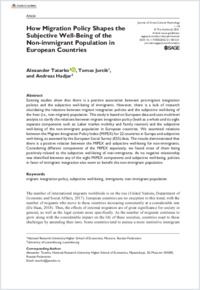How Migration Policy Shapes the Subjective Well-Being of the Non-immigrant Population in European Countries
BP2-STS
- Tatarko, Alexander ORCID National Research University Higher School of Economics, Moscow
- Jurcik, Tomas National Research University Higher School of Economics, Moscow
- Hadjar, Andreas University of Luxembourg, Luxembourg
- 2021
Published in:
- Journal of Cross-Cultural Psychology. - SAGE Publications. - 2021, vol. 52, no. 3, p. 316-333
anthropology
cultural Studies
social psychology
migrant integration policy
subjective well-being
immigrants
non-immigrant population
English
Existing studies show that there is a positive association between pro-migrant integration policies and the subjective well-being of immigrants. However, there is a lack of research elucidating the relations between migrant integration policies and the subjective well-being of the host (i.e., non-migrant) population. This study is based on European data and uses multilevel analysis to clarify the relations between migrant integration policy (both as a whole and its eight separate components such as: Labor market mobility and Family reunion) and the subjective well-being of the non-immigrant population in European countries. We examined relations between the Migrant Integration Policy Index (MIPEX) for 22 countries in Europe and subjective well-being, as assessed by the European Social Survey (ESS) data. The results demonstrated that there is a positive relation between the MIPEX and subjective well-being for non-immigrants. Considering different components of the MIPEX separately, we found most of them being positively related to the subjective well-being of non-immigrants. As no negative relationship was identified between any of the eight MIPEX components and subjective well-being, policies in favor of immigrant integration also seem to benefit the non-immigrant population.
- Faculty
- Faculté des lettres et des sciences humaines
- Department
- Département des sciences sociales
- Language
-
- English
- Classification
- Social sciences
- License
-
Rights reserved
- Open access status
- green
- Identifiers
-
- DOI 10.1177/00220221211001531
- ISSN 0022-0221
- Persistent URL
- https://folia.unifr.ch/unifr/documents/320291
Statistics
Document views: 105
File downloads:
- tatarko_2021_how: 221
